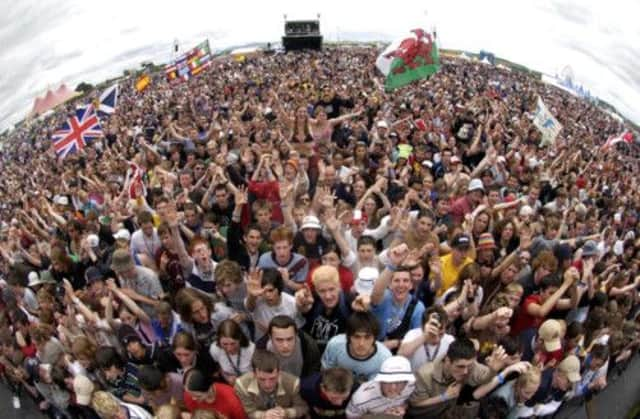Consumer Watch: Sour note for festivals as ticket prices soar over decade


In the sunny summer of 1970, 1,500 people paid the princely sum of £1 to watch glam rock band T-Rex play in the green fields of Somerset – with the added bonus of all the milk you could drink from the site’s cows.
The free milk may have long gone, but now Glastonbury Festival and other live music festivals are firmly embedded in UK culture, attracting around 18.6 million music fans each year. £17 million is pumped into the Scottish economy alone from tour-ists keen to experience the many festivals on offer – from T in the Park to Celtic Connections.
Advertisement
Hide AdAdvertisement
Hide AdHowever, the very concerts and festivals founded to bring music to the masses are in danger of alienating their audience as ticket prices have soared over the past decade.
In 2008, consumer group Which? criticised additional booking and postage costs to already expensive tickets for events such as concerts, saying such fees can lead to ticket agencies charging up to 30 per cent more.
Ticket prices for the iconic Glastonbury festival have risen by a staggering 95 per cent in the last ten years – from £105 in 2003 to £205 – before additional booking and postage costs of £5 per person and £6 per order, plus a £50 deposit – taking the initial outlay to around £265.
But Glastonbury is not the only festival to have dramatically upped its prices over the years, according to analysis by consumer site Watch My Wallet. Tickets to Reading Festival cost £95 a decade ago, and are now on sale for £202.50, a 113 per cent increase.
However, it is Scotland’s own T in the Park’s prices which have risen the most dramatically. Fans paid £82 for a camping ticket to see Coldplay, REM and Underworld headline the two-day event back in 2003, but this summer will pay £205 for three days of Rihanna, Mumford and Sons and the Killers – a staggering 150 per cent rise.
The “secondary ticket market” has also exploded in recent years due to the rise of websites such as Seatwave, eBay and Viagogo.
Veteran rockers the Rolling Stones sparked outrage earlier this month when it was revealed they would play two shows in London’s Hyde Park as part of the British Summer Time festival, with tickets costing £330 to stand near the stage and from £95 for the cheapest seats at the back of the park.
Their first performance on 6 June is almost 44 years to the day since the band last staged a show in the park – for free.
Advertisement
Hide AdAdvertisement
Hide AdWhilst UK festivals have undoubtedly grown in popularity over the past decade – leading to the need for extra space, security, staff, facilities, and extra days – is it fair that the fans have to bear the brunt of the cost?
Sean O’Meara of Watch My Wallet says that booking fees, travel expenses and the cost of food and drink on site may drive festival-goers to warmer climes – especially Europe, where festivals can cost a fraction of the price of their UK rivals.
He says: “While the economy has been in decline and people struggle with their finances, festivals have been consistently raising their prices year-on-year, normally by around £10.
“There are more and more festivals cropping up each year, which means there is more competition to get the big acts – and that often means having to fork out big payments, which are passed on to the festival goer.”
He added that many music fans are looking to the continent for their festival fix, as inexpensive flights, accommodation and food prices are becoming increasingly attractive.
Spain’s Benicassim festival, Rock Werchter in Belgium and Pinkpop in the Netherlands have all experienced increasing numbers of UK tourists enticed by lower pricing and (almost) guaranteed sunshine, making the experience part-festival, part-holiday.
However, Melvin Benn, managing director of Festival Republic, whose festivals include Reading, Leeds, Latitude and the Big Chill, points out that revellers can end up paying over the odds to transport their festival equipment abroad.
“The ticket prices tend to be a little bit cheaper, but low cost airlines tend to carry hidden costs,” he says. “Plus the quality of the acts tends to be much lower than those offered by UK festivals.”
Advertisement
Hide AdAdvertisement
Hide AdOrganisers argue that increased ticket prices reflect the cost of hiring the big name performers, who rely on income generated from live performances given the decline of revenue from record sales.
Benn insists that festival organisers try to keep price increases to a minimum, saying the costs most organisers are bearing are greater than the ticket prices reflect, which still remain less than inflation.
He says: “The economy and market is not strong enough to pass on the huge costs to the consumers. I’d rather make a modest amount of money than passing on the costs to the ticket prices. It’s a really tough market at the moment and we’re all in the same boat.”
He also argues that inflated ticket prices can be set because of the sheer level of demand to see coveted performers.
“At times the market is ridiculous,” he says. “For bands like the Rolling Stones to charge the best part of £1,000 a ticket when they haven’t had a new song for 20 years – it’s absolutely bananas.”
Thankfully it’s not all doom and gloom for the discerning festivalgoer. RockNess has announced that it had lowered the price of a three-day weekend and camping ticket by £20, and cheaper, independent festivals catering to a variety of musical tastes are becoming ever more popular as an alternative to the big names.